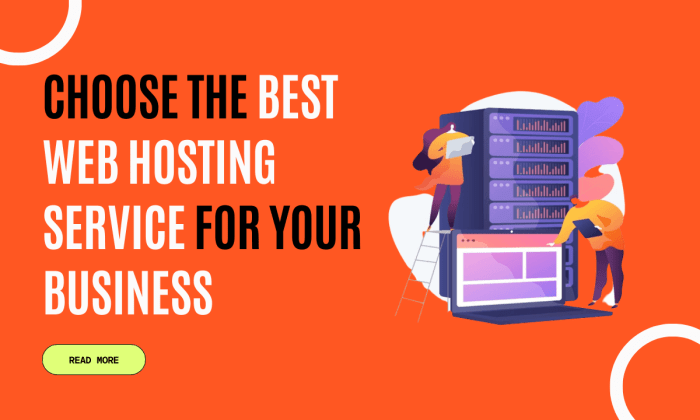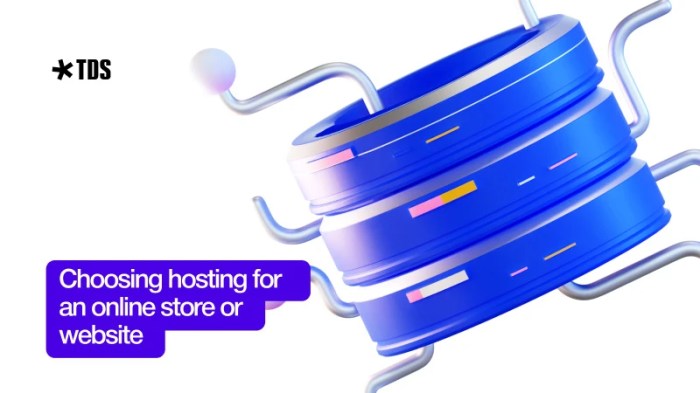How to Choose the Best Web Hosting for Your Online Store is a crucial decision for any business owner looking to establish a successful online presence. The right web hosting can make or break your online store’s performance, security, and overall customer experience. Navigating the world of web hosting can feel overwhelming, with numerous providers and plans offering a wide range of features and pricing.
This guide will equip you with the knowledge and insights to make an informed decision that aligns with your online store’s unique needs and goals.
From understanding your specific requirements to evaluating reputable web hosting providers, we’ll delve into the essential factors to consider. We’ll explore key features for e-commerce hosting, including security, uptime, and speed, as well as the importance of scalability and growth. Finally, we’ll discuss the critical role of customer support and resources in ensuring a smooth and reliable online store experience.
Understanding Your Needs
Choosing the right web hosting for your online store is crucial for its success. It’s like choosing the right foundation for your house; a strong foundation ensures stability and growth. To make the right decision, you need to understand your specific needs and requirements.
Identifying Your Online Store’s Requirements
Before choosing a web hosting plan, it’s important to assess your online store’s specific needs. This includes factors such as traffic volume, storage space, and bandwidth.
- Traffic Volume: This refers to the number of visitors your website receives each month. Estimate the average number of visitors you anticipate. If you expect high traffic, you’ll need a hosting plan that can handle the load. For example, if you’re launching a new online store and expect to attract thousands of visitors daily, you’ll need a hosting plan that can accommodate this volume.
- Storage Space: This refers to the amount of data your website can store. Consider the size of your product images, videos, and other files. A larger store with many products will require more storage space. If you plan to offer high-resolution images or large video files, you’ll need a hosting plan with ample storage.
- Bandwidth: This refers to the amount of data that can be transferred between your website and visitors’ computers. Higher bandwidth is essential for faster loading times and smoother browsing experiences. If you anticipate a lot of traffic, you’ll need a hosting plan with sufficient bandwidth to ensure smooth operation.
Essential Features for Your Online Store
In addition to the basic requirements, consider features that are essential for your store’s functionality and success.
- E-commerce Platforms: Your chosen web hosting should be compatible with the e-commerce platform you plan to use. Popular options include Shopify, WooCommerce, and Magento. Ensure your chosen hosting provider offers seamless integration with your preferred platform.
- Security: Protecting your customers’ data and financial information is paramount. Look for hosting providers that offer robust security features such as SSL certificates, firewalls, and malware protection. These measures help prevent unauthorized access and protect your store from cyberattacks.
- Customer Support: Having reliable customer support is crucial, especially when dealing with technical issues or customer inquiries. Choose a hosting provider that offers responsive and helpful support channels, such as live chat, email, or phone.
Comparing Different Types of Web Hosting
Several web hosting options are available, each with its own advantages and disadvantages.
- Shared Hosting: This is the most affordable option, where multiple websites share the same server resources. It’s suitable for small websites with low traffic volumes. However, shared hosting can be less reliable and offer limited resources, as you share the server with other websites.
- VPS Hosting: VPS hosting provides a virtualized server environment, giving you more control and resources than shared hosting. It’s a good option for websites with moderate traffic and specific resource requirements. VPS hosting offers more reliability and security than shared hosting.
- Dedicated Hosting: This is the most expensive option, where you have an entire server dedicated to your website. Dedicated hosting provides the highest level of performance, security, and control. It’s ideal for large websites with high traffic volumes and demanding applications.
- Cloud Hosting: Cloud hosting distributes your website across multiple servers, providing scalability and redundancy. It’s a flexible option that can adapt to changing traffic demands. Cloud hosting offers high availability, ensuring your website remains online even if one server experiences downtime.
Evaluating Web Hosting Providers

Once you have a clear understanding of your e-commerce store’s needs, it’s time to evaluate different web hosting providers. This involves researching reputable providers specializing in e-commerce hosting and comparing their features, pricing, and customer support.
Reputable Web Hosting Providers for E-commerce
Choosing the right web hosting provider is crucial for your online store’s success. Here are some reputable providers known for their e-commerce hosting solutions:
- Shopify: Shopify is a popular all-in-one platform for e-commerce businesses, offering built-in hosting, a user-friendly interface, and a wide range of features. It is ideal for small to medium-sized businesses.
- BigCommerce: BigCommerce is another popular e-commerce platform known for its scalability and performance. It offers a wide range of features and integrations, making it suitable for businesses of all sizes.
- WordPress.com: While primarily known for its website building platform, WordPress.com also offers hosting plans specifically for e-commerce. It provides a user-friendly interface, various themes and plugins, and built-in security features.
- GoDaddy: GoDaddy is a well-known web hosting provider offering a wide range of hosting plans, including e-commerce hosting. It is known for its affordability and user-friendly interface.
- HostGator: HostGator is another reputable provider offering shared, VPS, and dedicated hosting plans for e-commerce businesses. It is known for its reliable performance and affordable pricing.
- Bluehost: Bluehost is a popular web hosting provider known for its beginner-friendly interface and affordable pricing. It offers various hosting plans, including e-commerce hosting.
Comparing Features, Pricing, and Customer Support
After identifying potential providers, it’s essential to compare their features, pricing, and customer support.
- Features: Consider features like storage space, bandwidth, database support, security features, and e-commerce specific tools.
- Pricing: Compare pricing plans based on your needs and budget. Look for providers offering transparent pricing with no hidden fees.
- Customer Support: Evaluate the quality and availability of customer support. Look for providers offering 24/7 support through various channels like live chat, email, and phone.
Performance and Reliability
Performance and reliability are crucial for an e-commerce store.
- Uptime: Aim for providers with a high uptime guarantee (typically 99.9% or higher). This ensures your website remains accessible to customers.
- Speed: Website speed is critical for user experience and . Choose a provider offering fast loading times and optimized servers.
- Security: Security is paramount for e-commerce websites. Look for providers offering features like SSL certificates, firewalls, and malware protection.
Key Features for E-Commerce Hosting
Choosing the right web hosting for your online store is crucial for its success. Beyond the basics, certain features are essential for a secure, reliable, and user-friendly e-commerce experience.
Security Features for E-Commerce Websites
Security is paramount for any online store, as it directly impacts customer trust and protects sensitive data. Robust security measures are vital to prevent data breaches, fraud, and other cyber threats.
- SSL Certificates: An SSL certificate encrypts the communication between your website and visitors’ browsers, ensuring secure transmission of sensitive information like credit card details. Look for hosting providers offering free SSL certificates or providing the option to purchase one.
- Firewalls: Firewalls act as a barrier, protecting your server from unauthorized access and malicious attacks. They filter incoming and outgoing network traffic, blocking suspicious activity and preventing potential breaches.
- Malware Protection: Malware, such as viruses and spyware, can compromise your website’s security and steal customer data. Choose a hosting provider that offers comprehensive malware scanning and removal services, protecting your store from threats. Regular updates and patches for your website and its software are also crucial for maintaining security.
Uptime Guarantee and Loading Speed
For an online store, website uptime and loading speed are crucial for a positive customer experience. A website that is frequently down or slow to load can lead to lost sales and frustrated customers.
- Uptime Guarantee: A high uptime guarantee ensures your website is accessible to customers most of the time. Aim for a provider offering at least 99.9% uptime, minimizing downtime and potential revenue loss.
- Fast Loading Speeds: A fast-loading website is essential for a positive user experience. Slow loading times can lead to high bounce rates, meaning customers leave your website before making a purchase. Look for hosting providers that offer fast server speeds and caching mechanisms to optimize loading times.
E-Commerce Platform Integration and Shopping Cart Functionality
A robust e-commerce platform and reliable shopping cart functionality are essential for smooth online transactions.
- E-Commerce Platform Integration: Many hosting providers offer seamless integration with popular e-commerce platforms like Shopify, Magento, and WooCommerce. This integration simplifies the setup and management of your online store, providing features like product management, order processing, and payment gateways. Choose a provider that offers the integration you need for your specific platform.
- Built-in Shopping Cart Functionality: Some hosting providers offer built-in shopping cart functionality, allowing you to set up a basic online store without relying on external platforms. This can be a good option for smaller businesses or those starting with a limited product range. However, it’s essential to ensure the shopping cart features meet your needs, including secure payment processing, order tracking, and inventory management.
Scalability and Growth: How To Choose The Best Web Hosting For Your Online Store

Choosing a web hosting provider that can accommodate your future growth is essential for any online store. As your business expands, you’ll likely experience increased traffic, more product listings, and larger data storage needs. A scalable hosting plan allows you to seamlessly adapt to these changes without compromising performance or encountering technical difficulties.
Scalability Options, How to Choose the Best Web Hosting for Your Online Store
- Shared Hosting: Entry-level plans that share server resources with other websites. Typically, these plans have limited scalability options and may not be suitable for rapid growth.
- VPS Hosting: Offers more resources and control than shared hosting, allowing for greater scalability. You can typically upgrade your plan to a more powerful VPS or add additional resources as needed.
- Cloud Hosting: Highly scalable and flexible option that utilizes a network of servers to distribute your website’s workload. You can easily adjust your resources on demand, paying only for what you use.
- Dedicated Hosting: Provides a dedicated server exclusively for your website, offering the highest level of control and scalability. This option is often expensive but ideal for businesses with high traffic volumes and demanding performance requirements.
Comparing Scalability Costs
| Hosting Type | Initial Cost | Scaling Cost | Typical Use Cases |
|---|---|---|---|
| Shared Hosting | Low | Limited | Small businesses with low traffic |
| VPS Hosting | Moderate | Moderate | Growing businesses with moderate traffic |
| Cloud Hosting | Variable | Flexible and pay-as-you-go | Businesses with fluctuating traffic and high scalability needs |
| Dedicated Hosting | High | High | Large businesses with high traffic and demanding performance requirements |
Importance of Scalable Hosting
Choosing a web hosting provider with flexible scaling options offers several benefits for your online store:
- Improved Performance: As your website grows, you can add more resources to handle the increased traffic and ensure a smooth user experience.
- Reduced Downtime: Scalable hosting allows you to avoid performance issues and outages caused by traffic spikes or data storage limitations.
- Cost Efficiency: You only pay for the resources you need, avoiding unnecessary expenses associated with oversized hosting plans.
- Future-Proofing: A scalable hosting plan allows you to adapt to future growth without needing to switch providers or completely rebuild your website.
Customer Support and Resources

Running an online store requires a reliable and responsive web hosting provider that can support your business needs. While you may be focused on website design, product selection, and marketing, it’s crucial to consider the level of customer support and resources available from your web hosting provider. Having access to prompt and effective assistance can make a significant difference in your online store’s success, particularly during challenging situations or technical difficulties.
Customer Support Features
Having reliable customer support is crucial for any online business. This ensures you can address problems and resolve issues quickly. Look for web hosting providers that offer the following features:
- 24/7 Availability: Ensure your web hosting provider offers round-the-clock support, so you can access assistance anytime, regardless of your time zone or the urgency of the issue. This is especially important for online businesses that operate globally or experience high traffic volumes during peak hours.
- Live Chat: Live chat provides instant communication with a customer support representative. This is ideal for quick questions, technical troubleshooting, and urgent situations where a prompt response is critical.
- Phone Support: Phone support offers a direct and personal way to connect with customer support representatives. This is helpful for complex issues that require detailed explanations or for situations where a more personal touch is preferred.
- Email Support: While email support may not be as immediate as live chat or phone support, it’s still a valuable option for non-urgent inquiries or issues that require documentation. Ensure the provider offers reasonable response times and addresses your concerns promptly.
Documentation and Resources
In addition to direct customer support, web hosting providers should offer comprehensive documentation and resources to empower users to solve problems independently. These resources can be invaluable for troubleshooting, learning new features, and staying informed about updates.
- Knowledge Base: A well-organized knowledge base containing articles, FAQs, and tutorials can provide answers to common questions and guide you through various aspects of web hosting and e-commerce management.
- Community Forums: Access to a vibrant community forum allows you to connect with other users, share experiences, and seek assistance from both fellow users and support staff.
- Video Tutorials: Video tutorials offer a visual and interactive way to learn about web hosting features, technical configurations, and e-commerce best practices.
Provider Expertise and Response Times
When evaluating web hosting providers, consider the level of technical expertise and response times offered by their customer support teams. Look for providers that have a strong track record of resolving issues effectively and promptly.
- Technical Expertise: Ensure the customer support team has the technical knowledge to address your specific needs, whether it’s configuring security settings, troubleshooting website performance issues, or setting up payment gateways.
- Response Times: Evaluate the average response times for different communication channels, such as live chat, phone, and email. Look for providers that offer prompt responses and aim to resolve issues within a reasonable timeframe.
Choosing the best web hosting for your online store is an investment in your business’s future. By carefully considering your needs, evaluating providers, and prioritizing key features, you can secure a hosting solution that empowers your online store to thrive. Remember, the right web hosting partner will not only provide a stable platform for your online store but also offer the support and resources you need to achieve your business goals.
FAQ Guide
What are the different types of web hosting available?
There are several types of web hosting, each with its own advantages and disadvantages. Shared hosting is the most affordable option, but it shares resources with other websites. VPS hosting provides more resources and control, while dedicated hosting offers the highest level of performance and security. Cloud hosting is a scalable and flexible option that distributes resources across multiple servers.
How much does web hosting cost?
Web hosting costs vary depending on the type of hosting, features, and provider. Shared hosting plans can start as low as a few dollars per month, while dedicated hosting plans can cost hundreds of dollars per month. It’s important to compare prices from different providers to find the best value for your needs.
What is uptime and why is it important?
Uptime refers to the percentage of time that your website is available online. A high uptime is crucial for online stores, as downtime can lead to lost sales and customer dissatisfaction. Look for providers that offer a 99.9% or higher uptime guarantee.